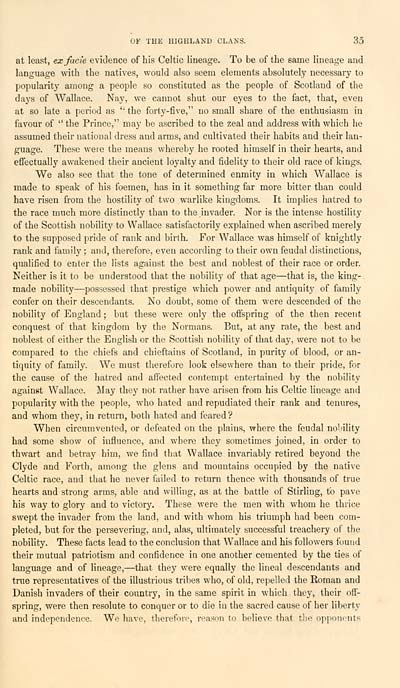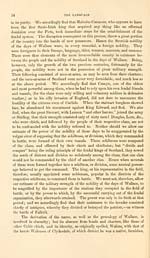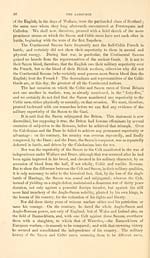Download files
Complete book:
Individual page:
Thumbnail gallery: Grid view | List view

OF THE HIGHLAND CLANS. 35
at least, ex facie evitlence of his Celtic lineage. To be of the same lineage and
language with the natives, would also seem elements absolutely necessary to
popularity among a people so constituted as the people of Scotland of the
days of Wallace. Nay, we cannot shut our eyes to the fact, that, even
at so late a period as " the forty-five," no small share of the enthusiasm in
favour of " the Prince," may be ascribed to the zeal and address with which he
assumed their national dress and arms, and cultivated their habits and their lan-
guage. These were the means whereby he rooted himself in their hearts, and
effectually awakened their ancient loyalty and fidelity to their old race of kings.
We also see that the tone of determined enmity in which Wallace is
made to speak of his foemen, has in it something far more bitter than could
have risen from the hostility of two warlike kingdoms. It implies hatred to
the race much more distinctly than to the invader. Nor is the intense hostility
of the Scottish nobility to Wallace satisfactorily explained when ascribed merely
to the supposed pride of rank and birth. For Wallace was himself of knightly
rank and family ; and, therefore, even according to their own feudal distinctions,
qualified to enter the lists against the best and noblest of their race or order.
Neither is it to be understood that the nobility of that age — that is, the king-
made nobility — possessed that prestige which power and antiquity of family
confer on their descendants. No doubt, some of them were descended of the
nobility of England ; but these were only the offspring of the then recent
conquest of that kingdom by the Normans. But, at any rate, the best and
noblest of either the English or the Scottish nobility of that day, were not to be
compared to the chiefs and chieftains of Scotland, in purity of blood, or an-
tiquity of family. We must therefore look elsewhere than to their pride, for
the cause of the hatred and affected contempt entertained by the nobility
against Wallace. May they not rather have arisen from his Celtic lineage and
popularity with the people, who hated and repudiated their rank and tenures,
and whom they, in return, both hated and feared ?
When circumvented, or defeated on the plains, where the feudal noMlity
had some show of influence, and where they sometimes joined, in order to
thwart and betray him, we find that Wallace invariably retired beyond the
Clyde and Forth, among the glens and mountains occupied by the native
Celtic race, and that he never failed to return thence with thousands of true
hearts and strong arms, able and willing, as at the battle of Stirling, to pave
his way to glory and to victory. These were the men with whom he thrice
swept the invader from the land, and with whom his triumph had been com-
pleted, but for the persevering, and, alas, ultimately successful treachery of the
nobility. These facts lead to the conclusion that Wallace and his followers found
their mutual patriotism and confidence in one another cemented by the ties of
language and of lineage, — that they were equally the lineal descendants and
triie representatives of the illustrious tribes who, of old, repelled the Roman and
Danish invaders of their country, in the same spirit in which they, their off-
spring, were then resolute to conquer or to die in the sacred cause of her liberty
and independence. We have, therefore, reason to believe that the opponents
at least, ex facie evitlence of his Celtic lineage. To be of the same lineage and
language with the natives, would also seem elements absolutely necessary to
popularity among a people so constituted as the people of Scotland of the
days of Wallace. Nay, we cannot shut our eyes to the fact, that, even
at so late a period as " the forty-five," no small share of the enthusiasm in
favour of " the Prince," may be ascribed to the zeal and address with which he
assumed their national dress and arms, and cultivated their habits and their lan-
guage. These were the means whereby he rooted himself in their hearts, and
effectually awakened their ancient loyalty and fidelity to their old race of kings.
We also see that the tone of determined enmity in which Wallace is
made to speak of his foemen, has in it something far more bitter than could
have risen from the hostility of two warlike kingdoms. It implies hatred to
the race much more distinctly than to the invader. Nor is the intense hostility
of the Scottish nobility to Wallace satisfactorily explained when ascribed merely
to the supposed pride of rank and birth. For Wallace was himself of knightly
rank and family ; and, therefore, even according to their own feudal distinctions,
qualified to enter the lists against the best and noblest of their race or order.
Neither is it to be understood that the nobility of that age — that is, the king-
made nobility — possessed that prestige which power and antiquity of family
confer on their descendants. No doubt, some of them were descended of the
nobility of England ; but these were only the offspring of the then recent
conquest of that kingdom by the Normans. But, at any rate, the best and
noblest of either the English or the Scottish nobility of that day, were not to be
compared to the chiefs and chieftains of Scotland, in purity of blood, or an-
tiquity of family. We must therefore look elsewhere than to their pride, for
the cause of the hatred and affected contempt entertained by the nobility
against Wallace. May they not rather have arisen from his Celtic lineage and
popularity with the people, who hated and repudiated their rank and tenures,
and whom they, in return, both hated and feared ?
When circumvented, or defeated on the plains, where the feudal noMlity
had some show of influence, and where they sometimes joined, in order to
thwart and betray him, we find that Wallace invariably retired beyond the
Clyde and Forth, among the glens and mountains occupied by the native
Celtic race, and that he never failed to return thence with thousands of true
hearts and strong arms, able and willing, as at the battle of Stirling, to pave
his way to glory and to victory. These were the men with whom he thrice
swept the invader from the land, and with whom his triumph had been com-
pleted, but for the persevering, and, alas, ultimately successful treachery of the
nobility. These facts lead to the conclusion that Wallace and his followers found
their mutual patriotism and confidence in one another cemented by the ties of
language and of lineage, — that they were equally the lineal descendants and
triie representatives of the illustrious tribes who, of old, repelled the Roman and
Danish invaders of their country, in the same spirit in which they, their off-
spring, were then resolute to conquer or to die in the sacred cause of her liberty
and independence. We have, therefore, reason to believe that the opponents
Set display mode to: Large image | Transcription
Images and transcriptions on this page, including medium image downloads, may be used under the Creative Commons Attribution 4.0 International Licence unless otherwise stated. ![]()
| Early Gaelic Book Collections > Blair Collection > Treatise on the language, poetry, and music of the Highland clans > (47) |
|---|
| Permanent URL | https://digital.nls.uk/76236920 |
|---|
| Description | A selection of books from a collection of more than 500 titles, mostly on religious and literary topics. Also includes some material dealing with other Celtic languages and societies. Collection created towards the end of the 19th century by Lady Evelyn Stewart Murray. |
|---|
| Description | Selected items from five 'Special and Named Printed Collections'. Includes books in Gaelic and other Celtic languages, works about the Gaels, their languages, literature, culture and history. |
|---|

